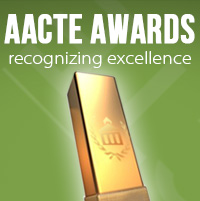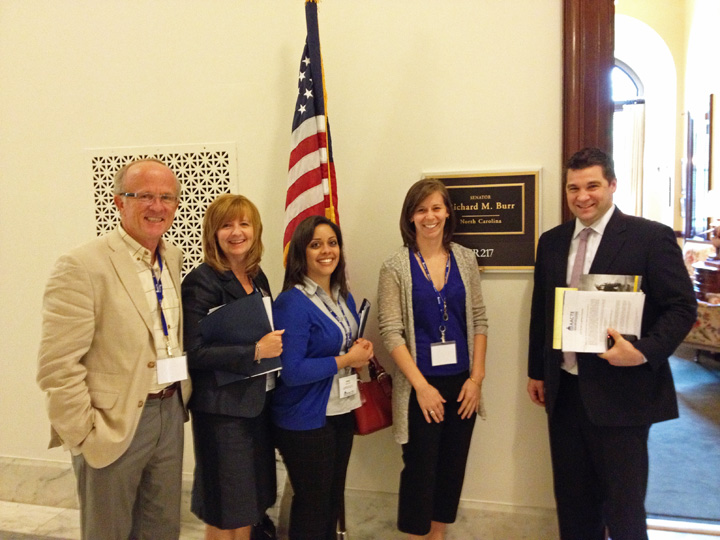28 Apr2014
By Jane E. West
On Friday at Dunbar High School in Washington, DC, Secretary of Education Arne Duncan and White House Domestic Policy Council Director Cecilia Muñoz announced movement on long-overdue teacher preparation regulations. These regulations are the successor to the spring 2012 negotiated rule making held by the Department of Education, which failed to reach consensus after several tumultuous sessions.
Joined on a panel at Friday’s event by Jim Cibulka (Council for the Accreditation of Educator Preparation), Camilla Benbow (Vanderbilt University, TN), Chris Minnich (Council of Chief State School Officers), Kaya Henderson (District of Columbia Public Schools), Elisa Villanueva Beard (Teach For America), and Secretary Duncan, Muñoz said the regulations are “something that the president has a real sense of urgency about.”
23 Apr2014
By Kristin McCabe
 AACTE is now accepting online nominations or applications for its 2015 Writing and Research Awards, with the following submission deadlines:
AACTE is now accepting online nominations or applications for its 2015 Writing and Research Awards, with the following submission deadlines:
Outstanding Book Award: Nominations due June 17
Outstanding Dissertation Award: Applications due August 14
Outstanding Journal of Teacher Education Article Award: Nominations from editors due October 1
23 Apr2014
By Elizabeth Ross
Last week, I participated in a summit at Lock Haven University in Pennsylvania on implementing and preparing for the Pennsylvania Core Standards. In attendance were the institution’s president and vice provost along with faculty, deans, and other administrators from throughout the university. Administrators and teachers from nearby PK-12 school districts as well as representatives from the Pennsylvania Department of Education also joined us.
Following my keynote presentation discussing the fundamental instructional shifts of the Pennsylvania Core, all vested stakeholder groups took part in a conversations addressing the impact of the standards on their programs and the supplemental changes necessary to enact to support implementation. Among the suggested changes were strengthening ties with the PK-12 districts to provide necessary clinical experiences for candidates and deepening core content knowledge of both in-service and preservice teachers. One great idea was for the university to host academies throughout the summer to provide training for PK-12 teachers and administrators.
17 Apr2014
By Jessica Milton
The deadline to apply for AACTE’s new research fellowship was March 28, and we are ecstatic about the number of submissions we received! Nearly 80 research teams from a variety of member institutions submitted applications to study educator preparation pedagogy and/or educator workforce development.
The AACTE Research Fellowship for Educator Preparation is a new program established under the Innovation Exchange that aims to cultivate emerging scholars and support high-quality research in the area of educator preparation. Aligned with AACTE’s mission and strategic goals, the research fellowship will engage education scholars in collecting, documenting, and disseminating research on innovative educator preparation practices to fuel program improvement and influence policy decisions.
17 Apr2014
By Jane E. West
Tomorrow, April 18, is the deadline for public comment on the proposed “highly qualified teacher” (HQT) data collection by the U.S. Department of Education. A detailed letter submitted yesterday by the Coalition for Teaching Quality hails the proposed collection as “an important first step towards meeting the legislative intent” of Congress’ directive to report on the extent to which students in certain high-need categories are taught by teachers who are labeled as “highly qualified,” but who are actually teachers-in-training in alternative routes.
17 Apr2014
By Kristin McCabe

Sam Miller and Marcie Rock (UNC-Greensboro), Gliset Colón (U. at Buffalo), and Mel Sullivan (UNC-Greensboro) with Chris Toppings, staffer for Senator Richard Burr (NC).
Have you considered bringing your graduate students to Washington, DC, for AACTE’s Day on the Hill? Last year, Marcia Rock, associate professor and director of doctoral studies in special education at the University of North Carolina at Greensboro, did just that with a cadre of graduate students in special education fields. Here is what they had to say about the experience:
Carly Roberts, Doctoral Scholar, University of Wisconsin-Madison:
I was fortunate to be able to attend five meetings on the Hill. I had never realized how accessible our congressman and senators were to constituents. These visits showed me what a powerful force lobbyists and individuals passionate about education can have in Washington. Seeing AACTE’s dedicated staff and all of the university representatives, teachers, and graduate students prepare for their visits with such fervor and passion was inspiring. The gains we’ve made in special education in the past 40 years would not have been possible without such inspired groups and individuals.
I realize now more than ever how important being an advocate for public education and for individuals with exceptionalities is, because I’ve seen firsthand how such advocacy really can have an impact.
15 Apr2014
By Kristin McCabe
Next month marks the 60th anniversary of the historic Brown v. Board of Education decision that put an end to legalized segregation of U.S. public schools. To commemorate the occasion, George Mason University (VA) is hosting a film screening and symposium on Monday, April 28. (AACTE is a promotional partner for the event.)
The free symposium, titled “Unspoken Histories of Unequal Education,” will kick off with an hors d’oeuvres reception at 6:00 p.m., followed by a screening of the film Stolen Education. After the movie, join the filmmaker (Professor Enrique Alemán, Jr., of the University of Utah) and other esteemed panelists to discuss the film and the impact and relevancy of Brown today.
15 Apr2014
By Lucy Berrier
 The Call for Nominations to serve on AACTE’s Board of Directors and standing committees is open at submit.aacte.org until May 9, 2014. One of the seven standing committees is the Committee on Membership Development and Capacity Building, focused on membership recruitment and retention, including the development of supporting programs and services. I asked the committee’s chair, Patricia Heydet-Kirsch, director of Assessment of Program Evaluation at Florida Atlantic University, to share why she was drawn to serve and what experiences she has gained.
The Call for Nominations to serve on AACTE’s Board of Directors and standing committees is open at submit.aacte.org until May 9, 2014. One of the seven standing committees is the Committee on Membership Development and Capacity Building, focused on membership recruitment and retention, including the development of supporting programs and services. I asked the committee’s chair, Patricia Heydet-Kirsch, director of Assessment of Program Evaluation at Florida Atlantic University, to share why she was drawn to serve and what experiences she has gained.
What caused you to want to serve on AACTE’s Committee on Membership Development and Capacity Building?
I was interested in serving on AACTE’s Committee on Membership Development and Capacity Building to understand the broader perspective of AACTE’s impact.
08 Apr2014
By Kristin McCabe
Seeking to identify promising research areas in teacher preparation as well as roles for the Journal of Teacher Education (JTE) in advancing and disseminating the field’s knowledge base, JTE editor Stephanie Knight (Penn State University) and AACTE assembled a group of advisers for a meeting last week in Philadelphia.
The meeting, held in conjunction with the annual conference of the American Educational Research Association (AERA), also included AACTE President/CEO Sharon P. Robinson and the following advisers:
08 Apr2014
By Elizabeth Ross
The College of Education at the University of Florida last week announced the launch of a new center on “Collaboration for Effective Educator Development, Accountability, and Reform”—also known as the CEEDAR Center—focused on supporting states in developing teachers to prepare students with disabilities for college and careers. CEEDAR is funded by the U.S. Department of Education’s Office of Special Education Programs, receiving $15 million over 3 years with the possibility of receiving additional funds for an additional 2 years.
08 Apr2014
By Kristin McCabe
Policy makers should allow more time for schools to implement the Common Core State Standards (CCSS), according to a statement released today by the Learning First Alliance.
The Alliance—a partnership of leading education organizations, including AACTE—wants policy makers to make sure instructional alignment and various supports are established before they apply high-stakes consequences to CCSS test results.
In support of this agenda, a new web site houses implementation success stories, such as podcasts from selected states, and a collection of other implementation resources.
03 Apr2014
By Christine Tambini
AACTE’s 2014 Leadership Academy will convene June 22-26 at the Marriott Milwaukee Downtown to develop rising leaders in educator preparation in an intensive networking and skill-building experience. Attendees will be guided by experienced deans and chairs of the Leadership Academy Faculty in developing the powerful leadership and administrative skills needed to succeed.
As registration gets under way for this year’s event, I called upon Kandi Hill-Clarke, dean of the Bayh College of Education at Indiana State University and alumna of the 2013 Leadership Academy, to tell me about her experience at last year’s event. Below she describes how she has used what she learned to become a more successful leader and dean.
02 Apr2014
By Tim Finklea
Last week’s conference of the Council for the Accreditation of Educator Preparation (CAEP) drew some 1,100 educators to Nashville, Tennessee, to learn more about the new accreditation system.
Offering workshops for the various accreditation pathways, a mixture of keynote presentations, panel and plenary sessions, networking events, and group work, the conference brought together educator preparation providers, member associations, researchers, and practitioners from across the country.
02 Apr2014
By Sharon Robinson
This post was originally published on the Learning First Alliance’s Public School Insights blog.
The teaching profession is well known for losing almost 50% of its novices in the first 5 years. This churn is concentrated in high-need schools, which have a hard time attracting teachers in the first place. Not only does this “revolving door” phenomenon increase the chance that students with the greatest educational needs will be taught by an inexperienced teacher, but it is also financially costly in recruitment, staffing, and induction burdens.
01 Apr2014
By Elizabeth Ross
Starting last week, approximately 4 million students across 36 states and the District of Columbia began taking field tests for the Common Core State Standards (CCSS) assessments developed by the PARCC and Smarter Balanced consortia. The field tests are scheduled to run March 24 through June 6.
A few states are piloting the tests on a broader scale. Nearly all students in California, Connecticut, Idaho, Montana, and South Dakota will participate in the field tests.







 AACTE is now accepting online nominations or applications for its
AACTE is now accepting online nominations or applications for its 
 The Call for Nominations to serve on AACTE’s Board of Directors and standing committees is open at
The Call for Nominations to serve on AACTE’s Board of Directors and standing committees is open at